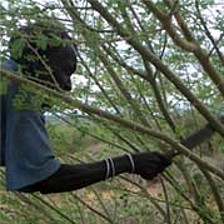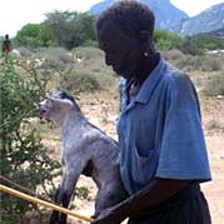Mutual learning of livestock keepers and scientists for adaptation to climate change in pastoral areas
(Small grant funded by BMZ)
Project duration: April 2010 to March 2012, total budget: 60 000 Euro
Background:
With increasing climate variability farmers strategies to buffer against variations become of predominant importance. This applies even more for pastoral livestock keepers since they earn their livelihoods in temporally and spatially highly variable environments under high production risk. In recent years, farmer to farmer exchange has been identified as a promising approach to facilitate learning of farmers to improve their production and livelihood systems.
Purpose:
The purpose of the project is to enhance adaptation to climate variability through effective knowledge sharing processes in vulnerable ecosystems of the arid and semi arid lands (ASALs) of Kenya. This involves development and adaptation of methods that render mutual learning between livestock keepers and scientist more effective.
Outputs:
- Methodology of livestock keepers to livestock keepers’ knowledge sharing, relevant to buffering against climate change in pastoral production systems adapted.
- Effective tools for documentation, reflection and scientific use of the knowledge exchange process developed.
- Analysis approach of decision making process and related rules on use of buffering strategies based on knowledge analysis and multi-agent based modeling and simulation developed.
- Methods published and shared with stakeholders of Non Governmental Organisations (NGO’s) and research institutions.
Methodology:
The focus of the project lies on enhancing livestock keepers and scientists learning on buffering strategies to climate variability based on knowledge generated during farmer-interactive extension. Facilitation of information exchange tools will be borrowed from both Participatory Learning and Action Research and systemic management. Capturing and sharing the knowledge gained thus requires reflection after the exchange sessions. Reflection will therefore be introduced as a systematic component into the livestock keepers’ exchange methodology. Results of the reflection process will enable:
- livestock keepers to discuss and share the knowledge they gained in the exchange process, also for better understanding and internalization of adaptive strategies,
- scientists to generate data to get in-depth understanding of the perspective of the livestock keepers, including their rules that they base their actions on.
The rules will be integrated in an agent based model and simulated for socio-climatic conditions and phenomena to enable testing of different possible scenarios by the scientists. Outcomes of the “what – if” analyses will be discussed with livestock keepers in feedback seminars.



